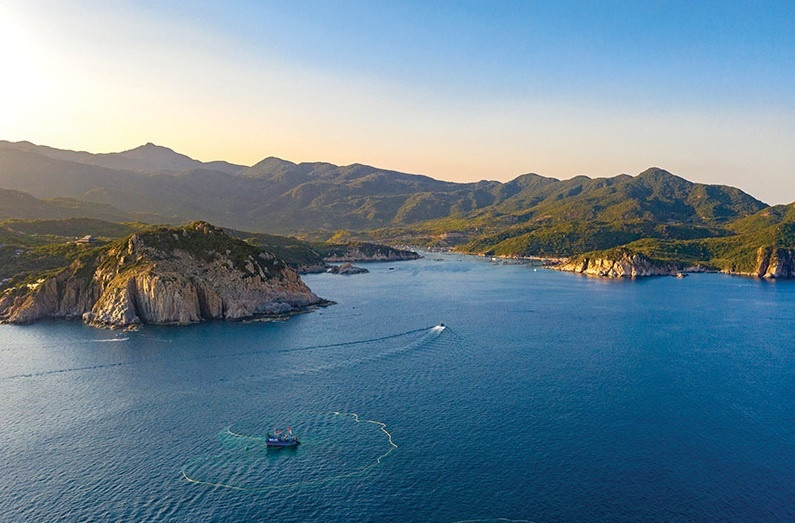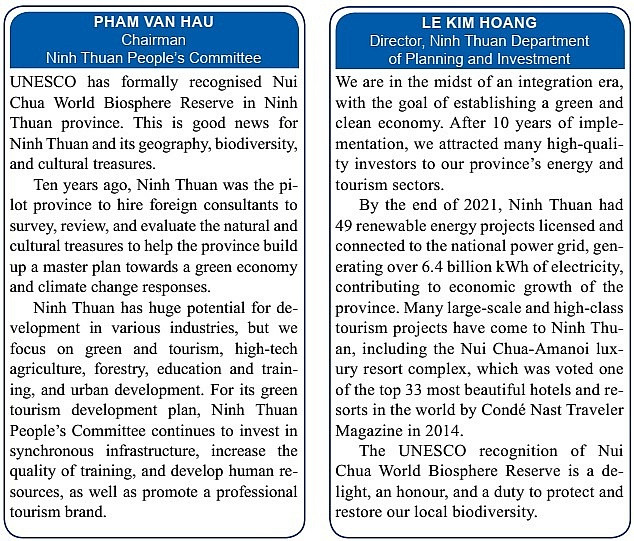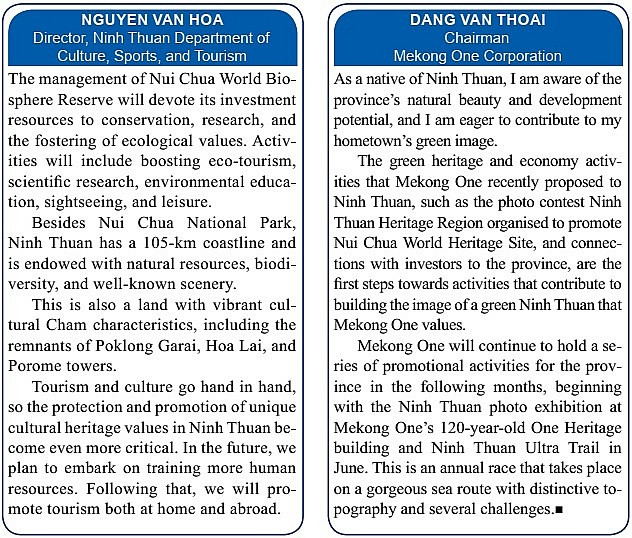 |
|
Nui Chua National Park, recognised by UNESCO as a world biosphere reserve, is opening up brand new opportunities to attract more potential investors into the province’s tourism. |
Bobby Nguyen is an expert with nearly 20 years of consulting experience, and is also an investor in two community-based ecotourism projects in the Mekong Delta and Da Bac mountain in the northern province of Hoa Binh.
Nguyen and his team are looking for an opportunity to develop a system of nature-based hospitality and services in Tram Chim National Park in the Mekong Delta province of Dong Thap. The wetlands there are famous for hosting several rare birds and more besides.
“International organisations and some investment funds, such as Mekong Capital, have shared with me their desire to develop sustainable projects,” Nguyen said. “It seems that investors are starting to ignore short-term benefits in search of core values in business. They are most concerned with the benefits that the product brings to the community, instead of profits.”
The development of green tourism is included in the national strategy on green growth for 2021-2030, with a vision towards 2050. And new hotspots that are not too crowded, but possess a lot of natural and cultural potentialities, are planned to be the next big tourism hope.
Ninh Thuan province on the south-central coast has aimed towards this goal for over a decade, with the provincial People’s Committee also implementing a programme on conservation and sustainable promotion of the value of Vietnamese cultural heritage for the 2021-2025 period.
Although detailed criteria for sustainable development and green tourism nationwide have not been issued yet, Ninh Thuan is ambitious to develop its industry with a harmonious combination of rich traditional culture and green tourism to maximise the advantages of the local unique resources, to become an emerging hotspot for both domestic and international visitors.
“We will consult the People’s Committee to integrate green tourism into the provincial planning, and drive businesses towards greener tourism products,” said Le Kim Hoang, director of Ninh Thuan Department of Planning and Investment, adding that calling for investments must also be consistent with the planning orientation.
According to the department, there are currently 58 tourism projects that have been licensed in the province, in which there are international-standard one having been put into operation such as the Nui Chua-Amanoi luxury resort complex, creating a driving force to promote the development of eco-luxury tourism in the province.
Ninh Thuan has policies to support livelihoods for local people to encourage conservation and promotion of intangible heritages and traditional festivals of ethnic minorities.
The province’s Nui Chua National Park has recently been recognised by UNESCO as a world biosphere reserve, opening up new opportunities for local tourism and contributing to attracting more potential investors.
Vu Thuc Hien, secretary of the National Committee of the Man and the Biosphere Programme of Vietnam, said that the biosphere reserve is strongly developing activities with the appearance of many businesses that have come into operation. “The new title will help the reserve become more visible and valued to international tourists, investors, and businesses, promising to attract more potential investors as well as biological research and conservation,” Hien said.
Bac Kan, meanwhile, is a northern mountainous province rich in tourism potential but is still underdeveloped. This province is also calling for investors to develop products for ecotourism and enhance cultural experiences.
Despite encouraging the development of large-scale resorts with high-quality services, selected projects must ensure the integration of cultural values and traditional identities of the ethnic groups in Bac Kan into the products provided to visitors, creating uniqueness and attractiveness, according to director of Bac Kan Department of Culture, Sports, and Tourism Ha Van Truong.
Currently, the province has offered a number of investors with programmes suitable for the development planning of the province to study and survey projects in urban areas, ecotourism areas, and resorts to build a complete tourism ecosystem. However, there are still barriers that need to be removed in terms of planning and connecting traffic routes between Bac Kan and other localities or attractions in the province. Human resources are also still limited.
“These factors make some investors, even though they are interested, still hesitate,” Truong said.
In the journey of building tourism into a spearhead economic sector, Moc Chau district in the northern mountainous province of Son La in recent years has also called for a number of investors to develop resorts, support people in community-based tourism to improve livelihoods, and attract more overseas visitors. Moc Chau aims to develop more world-class products that are also community-based. The district has already coordinated with sustainable development projects to train local people with more skills in tourism as well as support funds for them to develop more services.
Dinh Thi Huong, director of Moc Chau Department of Culture and Information, said, “The district aims to develop culture and agriculture to promote tourism, and it must go hand-in-hand with preserving cultural values.”


Source: VIR